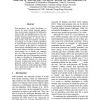Free Online Productivity Tools
i2Speak
i2Symbol
i2OCR
iTex2Img
iWeb2Print
iWeb2Shot
i2Type
iPdf2Split
iPdf2Merge
i2Bopomofo
i2Arabic
i2Style
i2Image
i2PDF
iLatex2Rtf
Sci2ools
123
click to vote
COLING
2010
2010
Discriminative Training for Near-Synonym Substitution
Near-synonyms are useful knowledge resources for many natural language applications such as query expansion for information retrieval (IR) and paraphrasing for text generation. However, near-synonyms are not necessarily interchangeable in contexts due to their specific usage and syntactic constraints. Accordingly, it is worth to develop algorithms to verify whether near-synonyms do match the given contexts. In this paper, we consider the near-synonym substitution task as a classification task, where a classifier is trained for each near-synonym set to classify test examples into one of the near-synonyms in the set. We also propose the use of discriminative training to improve classifiers by distinguishing positive and negative features for each nearsynonym. Experimental results show that the proposed method achieves higher accuracy than both pointwise mutual information (PMI) and n-gram-based methods that have been used in previous studies.
COLING 2010 | Computational Linguistics | Natural Language Applications | Near-synonym Substitution Task | Useful Knowledge Resources |
Related Content
| Added | 13 May 2011 |
| Updated | 13 May 2011 |
| Type | Journal |
| Year | 2010 |
| Where | COLING |
| Authors | Liang-Chih Yu, Hsiu-Min Shih, Yu-Ling Lai, Jui-Feng Yeh, Chung-Hsien Wu |
Comments (0)

